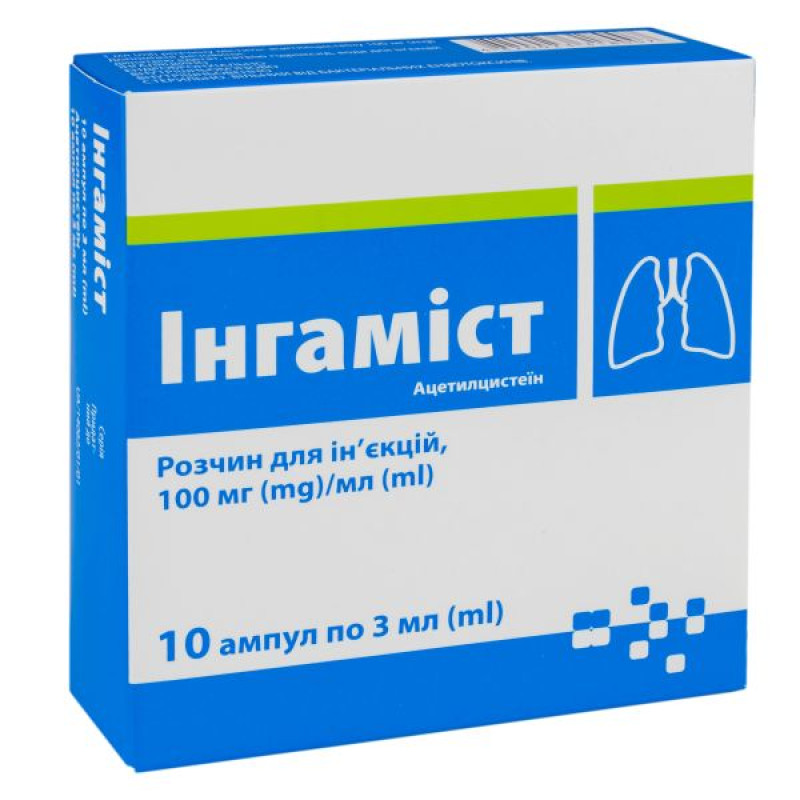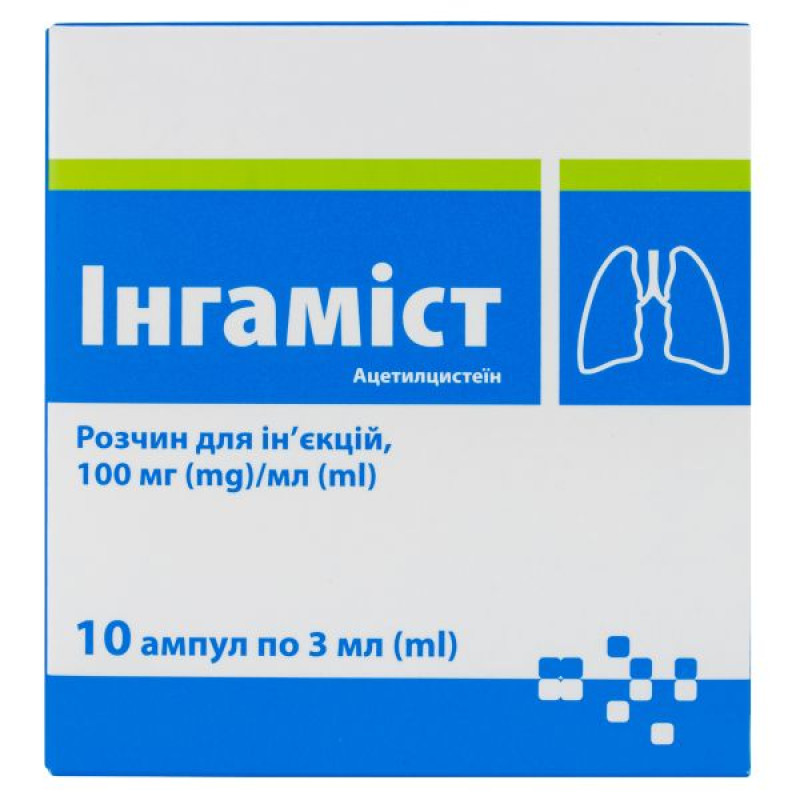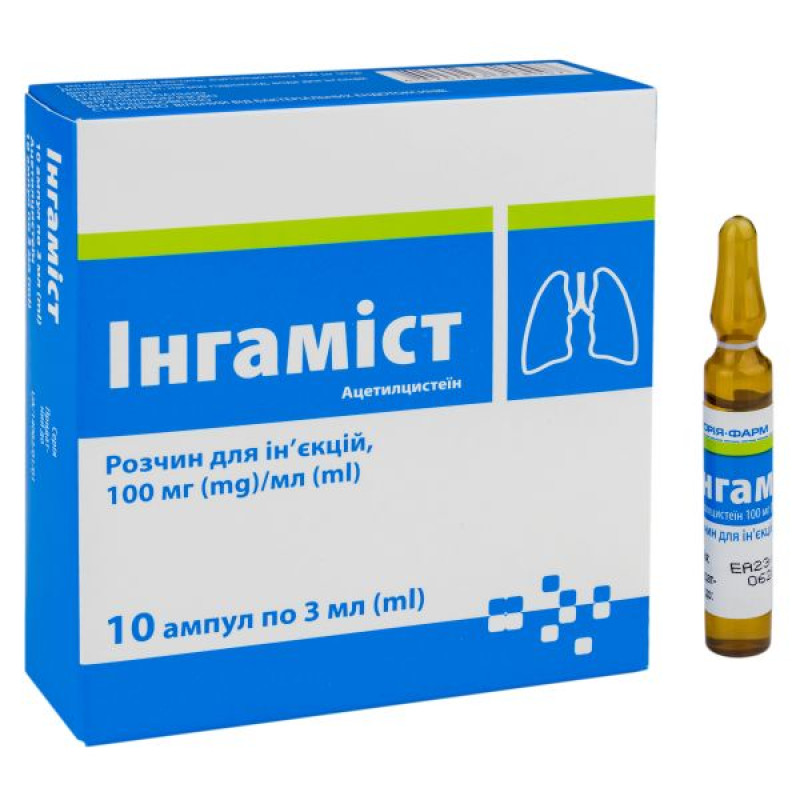Ingamist solution for injection 10% ampoule 3 ml No. 10

Instructions Ingamist solution for injection 10% ampoule 3 ml No. 10
Composition
active ingredient: acetylcysteine;
1 ml contains acetylcysteine 100 mg;
Excipients: disodium edetate, sodium hydroxide, water for injections.
Dosage form
Solution for injection.
Main physicochemical properties: clear colorless liquid with a faint sulfur odor.
After opening the ampoule, a faint pink-purple hue may appear upon prolonged contact with air.
Pharmacotherapeutic group
Mucolytic agent. ATX code R05C B01.
Pharmacological properties
Pharmacodynamics.
Acetylcysteine thins sputum. In the structure of acetylcysteine, sulfhydryl groups contribute to the rupture of disulfide bonds of acidic mucopolysaccharides of sputum, which leads to depolarization of mucoproteins and a decrease in mucus viscosity. The drug retains activity in the presence of purulent sputum.
Acetylcysteine has an antioxidant effect due to the presence of a nucleophilic thiol SH-group, which easily donates hydrogen, neutralizing oxidative radicals.
The protective mechanism of acetylcysteine is based on the ability of its reactive sulfhydryl groups to bind free radicals.
Acetylcysteine easily penetrates the cell, is deacetylated to L-cysteine, from which intracellular glutathione is synthesized.
Glutathione is a highly reactive tripeptide, a powerful antioxidant, cytoprotector that captures endogenous and exogenous free radicals and toxins. Acetylcysteine prevents depletion and helps increase the synthesis of intracellular glutathione, which participates in redox processes in cells, thus contributing to the detoxification of harmful substances.
Pharmacokinetics.
With intravenous administration of 600 mg of acetylcysteine, the maximum concentration in blood plasma is 300 mmol/l, the half-life from blood plasma is 2 hours. Total clearance is 0.21 l/h/kg, and the volume of distribution at plateau is 0.34 l/kg. Acetylcysteine penetrates into the intercellular space, is mainly distributed in the liver, kidneys, lungs, bronchial secretions. Acetylcysteine and its metabolites are excreted mainly by the kidneys.
Indication
Acute and chronic respiratory diseases accompanied by increased sputum production.
Contraindication
Hypersensitivity to acetylcysteine or to other components of the drug, gastric and duodenal ulcer in the acute stage, hemoptysis, pulmonary hemorrhage.
Interaction with other medicinal products and other types of interactions
Concomitant use of acetylcysteine with antitussives may increase sputum congestion due to suppression of the cough reflex.
Concomitant administration of acetylcysteine and nitroglycerin may lead to increased vasodilation of the latter. Patients should be warned about the possibility of a decrease in blood pressure and headache.
It is not recommended to use antibiotics and acetylcysteine in the same syringe: a decrease in the activity of antibiotics is possible.
Due to its ability to form chelate structures, acetylcysteine can reduce the bioavailability of salts of metals such as gold, calcium, and iron. Therefore, it is recommended to use these drugs at different times.
Laboratory indicators
The use of acetylcysteine may alter the results of colorimetric salicylate quantification and urine ketone determination.
Application features
Patients with bronchial asthma should be under medical supervision during Ingamist therapy. In case of bronchospasm, acetylcysteine should be discontinued immediately.
Ingamist should be used with caution in patients with a history of peptic ulcer, especially in case of concomitant administration of other drugs that irritate the gastric mucosa.
Acetylcysteine, especially at the beginning of therapy, can dilute bronchial secretions and increase their volume. If the patient cannot cough up sputum effectively, postural drainage and aspiration of bronchial contents should be performed.
Intravenous administration of the drug should be carried out under strict medical supervision. Side effects of intravenous administration of acetylcysteine may occur more often if the drug is administered too quickly or in large doses. Therefore, it is recommended to strictly follow the instructions given in the section "Method of administration and dosage".
This medicinal product contains 43 mg (1.9 mmol) of sodium per ampoule. This should be taken into consideration by patients on a controlled sodium diet.
Ingamist solution should not come into contact with rubber and metal surfaces.
The faint sulfuric odor of the solution is the characteristic odor of the active substance.
For intravenous and intramuscular administration, open the ampoule immediately before using the drug. For external use, partial use of the ampoule contents is possible: the remaining solution can be used (under proper storage conditions) within 24 hours for external use only; the use of the remaining solution for injections is prohibited.
Use during pregnancy or breastfeeding
During pregnancy or breastfeeding, the use of acetylcysteine is possible only if the expected benefit to the mother outweighs the potential risk to the fetus or child, and under the direct supervision of a physician.
Ability to influence reaction speed when driving vehicles or other mechanisms
There is no data confirming the effect on the reaction rate.
Method of administration and doses
Topical application
Inhalation administration: adults 1 ampoule 1-2 times a day as prescribed by a doctor for 5-10 days, children from 6 years old - up to 1 ampoule 1-2 times a day as prescribed by a doctor for 5-10 days.
Endobronchial administration: adults and children from 6 years of age - up to 1 ampoule 1-2 times a day.
Systemic application
Intramuscular injection
Adults - 1 ampoule of 300 mg 1-2 times a day, administered deeply intramuscularly.
Intravenous administration
The drug should be administered slowly dropwise in 0.9% sodium chloride solution or 5% glucose solution.
Adults: 1 ampoule of 300 mg 1-2 times a day.
Children.
The drug is not used for intramuscular and intravenous administration to children (preferably oral dosage forms).
For topical use, the drug should be prescribed to children from 6 years of age.
Overdose
When administered intravenously
Symptoms
Symptoms of overdose are similar to symptoms of severe adverse reactions.
Treatment
Treatment requires immediate discontinuation of the drug and symptomatic therapy. There is no specific antidote. Effective dialysis.
When applied topically
Symptoms
High doses of the drug may cause the secretion of large amounts of bronchopulmonary secretions, which will lead to airway obstruction.
Treatment
Mechanical removal of mucus from the tracheobronchial tree.
Adverse reactions
With local application, the following reactions are possible:
from the immune system: hypersensitivity reactions;
from the respiratory system: bronchospasm, rhinorrhea;
from the digestive system: stomatitis, vomiting, nausea;
Skin: urticaria, rash, itching.
With parenteral use, the following reactions are possible:
from the immune system: anaphylactic shock, anaphylactic reactions, anaphylactoid reactions, hypersensitivity;
Cardiovascular system: tachycardia, decreased blood pressure;
from the respiratory system: bronchospasm, dyspnea;
from the digestive system: vomiting, nausea, abdominal pain, diarrhea, dyspepsia, heartburn;
on the part of the skin: angioedema, urticaria, hyperemia, burning sensation at the injection site, rash, itching, in rare cases, the development of Stevens-Johnson syndrome and Lyell's syndrome is possible;
others: facial edema, headache, tinnitus, hemorrhages, hyperthermia, anemia, prolongation of prothrombin time.
Expiration date
2 years.
Storage conditions
Store at a temperature not exceeding 30 ° C in the original packaging.
Keep out of reach of children.
Incompatibility
Ingamist solution should not come into contact with rubber and metal surfaces.
Packaging
3 ml in dark glass ampoules; 5 ampoules in a contour blister pack; 2 contour blister packs in a pack.
Vacation category
According to the recipe.
Producer
LLC "Yuria-Pharm".
Location of the manufacturer and its business address
Ukraine, 18030, Cherkasy, Verbovetskogo St., 108. Tel. (044) 281-01-01.
There are no reviews for this product.
There are no reviews for this product, be the first to leave your review.
No questions about this product, be the first and ask your question.














